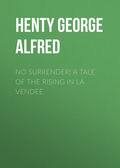
Henty George Alfred
Condemned as a Nihilist: A Story of Escape from Siberia
CHAPTER XVIII.
HOME AGAIN
Godfrey felt in wild spirits as they hoisted their sail, for the end of the journey was close at hand, and, unless some altogether unforeseen misfortune were to befall them, they would have accomplished an undertaking that had been deemed almost impossible. They kept well out from land, increasing the distance as they sailed west until they were some ten miles out, for the map showed that some five-and-twenty miles from the point where they had camped a rocky peninsula jutted out. In three hours they could make out its outline, for the land was bold and high, and it took them another four hours before they were abreast of its eastern point, Cape Navalok. Then they coasted along the peninsula until they arrived at Cape Kekour, its western point. They had now been paddling nearly twelve hours, for Godfrey was too impatient to be content with the sail only. Just before they arrived at the cape, Luka, seeing a good place for landing, suggested a halt.
"No, no," Godfrey said, "we will not risk another landing. We have been marvellously fortunate up to now, and it would be folly to run even the slightest risk when we are so near the end of our journey. We will keep on. There are only thirty or forty more miles to go, and then we shall enter the Voranger Fiord. Then we shall be in Norway. Think of that, Luka! We can snap our fingers at the Russians, and tell everyone we meet that we have escaped from their prisons."
"Who shall we meet?" Luka asked.
"Ah, that is more than I can tell you. The sooner we meet some one the better. Norway is not like this country we have been passing along; it is all covered with great mountains and forests. I don't know anything about the coast, but I fancy it is tremendously rocky, and we should have a poor chance there if caught in another storm from the north. There are Laplanders, who are people just like the Samoyedes, and who have got reindeer; if we find any of them, as I hope we shall, we ought to be all right. We have got a hundred silver roubles, and if you show a man money and make signs you want to go somewhere, and don't much care where, he is pretty safe to take you. Now you take a sleep, Luka. I will steer. There is no occasion to paddle, the wind is taking us along nearly three miles an hour, and time is no particular object to us now. You get three hours, then I will take three, and then we will set to with the paddles again."
Eight hours later they could make out high land on the starboard bow, and knew that they were approaching the entrance to the fiord. They had not taken to their paddles again, for the wind had freshened, and they were going fast through the water. Luka cooked a meal, and as it was growing dark the land closed in on both sides to a distance of about eight miles.
An hour later they saw lights on their right hand. "Hurrah!" Godfrey exclaimed, "there is a village there. We won't land to-night. We might find it difficult to get a place to sleep in. One night longer on board won't do us any harm. Thank God we are fairly out of Russia at last, and shall land as free men in the morning."
They drew in towards the shore a mile or so above the lights, and paddled cautiously on until close to the land. There they dropped their anchor overboard, and, wearied out by their long row, were speedily sound asleep.
It was broad daylight when they woke. Godfrey, when he sat up, gave a loud cheer, which set Jack off barking wildly. "Look!" Godfrey shouted, "it is a town, and there are two steamboats lying there. Thank God, our troubles are all over. You had better get breakfast, Luka. It is of no use going ashore till people are awake."
Breakfast over the anchor was at once pulled up, and in a quarter of an hour they were alongside a quay. Their appearance was so similar to that of the Lapps that they themselves would have attracted but little notice, but the canoe was so different in its appearance to those used by these people that several persons stood on the little quay watching them as they came alongside. Their surprise at the boat was increased when Godfrey came up on to the quay. No Laplander or Finn of his height had ever been seen, and moreover, his face and hands were clean. They addressed him in a language that he did not understand. He replied first in English, then in Russian. Apparently they recognized the latter language, and one of them motioned to Godfrey to follow him.
"You wait here till I come back, Luka. I daresay the people are honest enough, but I don't want any of our furs or things stolen now that we have got to the end of our journey."
He then followed his conductor to a large house in the principal street, where he went in to a sort of office and spoke to a man sitting there. Then he went out, and in a minute returned with a gentleman.
"Do you speak English, sir?" Godfrey said.
"I speak it a little," the gentleman replied in surprise at hearing the language from one who looked like a Laplander.
"Do you speak Russian better?" Godfrey next asked.
"Yes," he replied in that language. "I know Russian well. And who are you?"
"I am an Englishman. I was resident in St. Petersburg when I was seized and condemned to exile in Siberia as a Nihilist, although I was perfectly innocent of the charge. I was taken to the mines of Kara in the east of Siberia, but made my escape, descended the Yenesei, and have coasted from there in a canoe."
The man looked at him incredulously.
"I am not surprised that you doubt my story," Godfrey said. "If you will come down with me to the wharf you will see the canoe in which I made the journey. I built it on the Yenesei. I have with me a Tartar who escaped with me and shared my fortunes."
The merchant put on his hat and walked down to the wharf.
"It is a strange craft," he said, "though I have seen some at Christiania similar in form but smaller, built of wood, that Englishmen have brought over. And is it possible that you have sailed from the mouth of the Yenesei in her?"
"There has been no great difficulty about it," Godfrey said. "We have kept near the coast, and have generally landed when bad weather came on. I have a gun, and with that and fishing there has been no difficulty about food. The journey has been a long one. It is seventeen months since I left Kara. I am provided with Russian money, sir, and shall be glad if you can tell me what is my best way of getting back to England."
"It is fortunate indeed that you did not arrive here two days later, for the last steamer will sail for Hamburg to-morrow. She touches at many ports on her way, but I don't know that you can do better than go to Hamburg, whence there is a steamer nearly every day to England. If you had been two days later you would have lost her, for the season is just over, and you would then have had to travel by land and river down to Tornea on the Gulf of Bothnia. But come up with me to my house; I am the agent here for the steamer. What are you going to do with your canoe?"
"I shall take her home with me just as she stands," Godfrey said.
"And the Tartar?"
"Yes, the Tartar and the dog."
"Very well. Stay here for ten minutes," he said to Luka, "I will send a man down to help you up with the canoe. We may as well put it in my yard," he went on as he started back with Godfrey. "The people are as honest as the day, but they might be pulling it about and examining it, and it is just as well to stow it away safe. Well, this is a wonderful escape of yours! During the twenty years I have been here, it has never happened before."
"I wonder it has not been done many times," Godfrey said. "Canoes go from Archangel to the Petchora, which is quite half-way to the mouth of the Obi, and there is no more difficulty between the Petchora and the Yenesei than there is on this side. The first thing to do now is to get some clothes."
"The first thing to do, I think, is to get some breakfast," the trader said.
"I have already had some breakfast on board," Godfrey said; "but I daresay I can eat another."
"I will warrant you can. Your breakfast was probably of the roughest."
"It was," Godfrey admitted. "I have not eaten a piece of real bread for more than a year. We haven't had much of anything made of flour since we started in the canoe in June; but one gets to do without bread very well."
"I have not asked you your name yet," the trader said.
"It is Godfrey Bullen. My father is head of a firm in London that does a good deal of trade with Russia. He was Living in St. Petersburg a good many years. That is how it is that I speak the language."
"I was wondering how it was that you spoke it so well. Now, then, let me introduce you to my wife and family. This is an English gentleman, wife," he said in his own language to a pleasant-looking lady. "He does not look like it, but when I tell you that he has made his escape from Siberia in a canoe it will account for it."
Godfrey found that his early meal had in no way abated his appetite. The breakfast was an excellent one, but he confined himself to bread and butter, and thought he had never tasted anything so good in his life. He learned that his host was an importer of goods of all kinds, and did the principal trade at Vadsö, besides supplying all the villages on the fiord.
"If you had been here a few days earlier," he said, "you would have found a countryman of yours, a Mr. Clarke, who almost monopolizes the whaling trade here. He owns three steamers, and has a great melting-down establishment. I myself send great quantities of cod to Hamburg by steamer. Most of the boats here work for me."
After breakfast Godfrey gave his host a sketch of his adventures.
"It has been a wonderful journey," his host said when he concluded. "I have heard of one or two cases where men have made their way to Archangel, and thence by land to our frontier, but I never heard of anyone attempting it by sea before. It was a perilous journey indeed, and required a knowledge of canoeing, which no Russian prisoner would be likely to have. Then you were certainly fortunate in having a companion with you who was at home with those Ostjaks. Still, as you brought him with you for that purpose, that was forethought rather than luck."
"Which is the first port at which the steamer will stop that I can send a telegram from?"
The merchant laughed. "If you go down-stairs into the office, and go through the door to your left hand, you will find yourself in a telegraph office."
"Really?"
"Yes, really. We have had the telegraph here for some little time."
Godfrey rushed down-stairs, and sent off a telegram as follows: —
"Have just arrived here. Made my escape from prison at Kara, in Siberia. Seventeen months on the way. Am in first-rate health. Start to-morrow by steamer to Hamburg. Hope all are well. Have plenty of money."
He directed it to his father's office, so that the news might be broken gradually to his mother. In the afternoon the answer came: —
"Thank God for His mercies. All well. I shall cross to Hamburg to meet you."
While Godfrey was being made much of by the merchant and his family, and, indeed, by many of their acquaintances, who, upon hearing the news, came in to see him and inquire into the wonderful voyage, Luka was no less a centre of attraction to the fishermen, and was so generously treated that long before it became dark he was obliged to be assisted, in a state of inebriation, to a pallet that had been prepared for him. Godfrey was annoyed when he heard it; "but," as his host said, "after being eighteen months, and, for aught I know, eighteen months before that, without touching liquor, very little would be likely to produce an effect upon him. I daresay it is his talking as much as the spirit that has turned his head; besides, you know, the lower class of Russians and Tartars are all fond of spirits."
"I shall not be angry with him in the morning," Godfrey said, "because I do think that it is pardonable; but I shall talk seriously to him about it, and tell him that if he is coming home to England with me he must give up spirits. He has done without them so long that it can't be any hardship."
"What are you going to do with him?"
"I have not the most remote idea," Godfrey laughed. "If he likes to return to his people I daresay my father would be able, through the Russian embassy, to get a pardon for him and permission to go back; but I don't think he has any notion of that. He lost his parents when he was a child, and I never heard him express the slightest desire to go back again. He has attached himself to me heart and soul, and I think looks upon it as a settled thing that he will be always with me. I don't know in what capacity, still, I suppose, something will be found for him."
The steamer was to start at nine o'clock on the following morning, and by that hour Godfrey, Luka, and Jack were on board and the canoe carefully stowed on deck. Both had obtained a complete fit-out from the merchant's stores, and although Godfrey's garments would scarcely have passed muster in London, they did very well for the voyage. Luka was greatly amused at his own appearance in European garb, though Godfrey thought he looked much better in his Ostjak costume.
"We will rig him out fresh when I get him home," he said to the merchant. "I don't know what he looks like now in that greatcoat and billycock hat."
The merchant stayed on board until the last moment. As soon as he got into his boat the paddles began to revolve and the steamer started on her way. She was ten days on her voyage, ascending many of the fiords, landing or taking on board cargo or passengers.
Godfrey enjoyed the voyage greatly. The scenery was magnificent, and eagerly as he desired to be at home, he was almost sorry when the end approached. It had been so strange to have nothing to do but to sit and watch the shore, to eat and to sleep. Luka had been very penitent over his little excess at Vadsö, and had solemnly promised Godfrey to abstain from spirits in future; and he, too, enjoyed the voyage in his way, eating enormously, and drinking vast quantities of tea and coffee. Godfrey had sent off one or two telegrams from the ports at which he touched, so that his father might be able to judge when the ship was likely to arrive; and when one morning early the vessel steamed up to the wharf at Hamburg Godfrey saw him waiting there. It was a joyful meeting indeed, and it was not until they were alone together at an hotel, Luka being left down-stairs in charge of the canoe, that they were enabled to begin to talk.
"Did you know what had become of me, father?"
"Yes, my boy. Petrovytch telegraphed to me that you had been missing three days, and I at once went over to St. Petersburg. He thought that you had fallen into bad hands, and had been murdered and thrown into the Neva; but remembering that you had got into that silly scrape before with the police, I thought it possible that, coming, as your absence did, directly after the affair at the Winter Palace, suspicion had fallen on you again. I went to the head of the police; he declined to give me any information. Then I set the embassy at work, and they found out that you had been arrested with some desperate Nihilists. At last they obtained a sight of the records of the court-martial before which you had been tried, and told me that the case was so strong against you that nothing could be done; indeed, had it not been for your youth, and the fact that you were a British subject, you would certainly have been executed. I tried everything, but I found it absolutely useless. The embassy recommended me to let the matter drop for the present, and in time, perhaps, when the Nihilist scare passed off, it might be possible to interest some minister or other in your favour and obtain a reversion of your sentence. Then a few months later came the assassination of the Czar, and, of course, that rendered it more hopeless than ever, and all we could hope for was, that in the course of years we might again move in the matter. Of course it has been a terrible business for us all. But we won't talk about that now. Thank God it is over, and that you have returned to us. But what madness, Godfrey, to mix yourself up with these people!"
"Indeed, father, I was perfectly innocent, though I cannot blame the court-martial for finding me guilty." And he then gave his father the details of his connection with the two Nihilists Akim Soushiloff and Petroff Stepanoff, and of the circumstances of his arrest in their room.
"I am very glad to hear that, Godfrey. Not that it makes any actual matter now, but because, after the warning I had given you to avoid the society of any people holding extreme opinions, it seemed to me you must have showed an incredible amount of wilfulness and folly in getting yourself mixed up with these desperate conspirators. I am heartily glad to find that I was mistaken, and that, except as regards that foolish business at the theatre, you have really not been to blame in the matter, and have been altogether a victim of circumstances. Now, tell me how you got away. And first, who is that queer-looking little fellow with your canoe?"
"He is my comrade and friend, father. He escaped from prison with me, and is devoted to me; but for him I should have had no chance whatever of making my way through all the difficulties of the journey." And he then gave his father an outline of their adventures from the time of their leaving Kara.
When he had finished, Mr. Bullen went down-stairs and saw Luka, and shook hands with him heartily, telling him in Russian that he had heard from Godfrey how much he owed to him, and assuring him that he need have no fear for the future.
Two days later the party arrived at home. There is no occasion to say anything as to the joy of that meeting. The three years of hardship and roughing it had converted the careless school-boy into a powerful young fellow. His spirits were as high and he was as full of fun as of old; but the experience he had gone through had strengthened his character, had given him self-reliance and confidence, and had, as his father and mother soon saw, had a very beneficial effect in forming his character.
Two or three days after his arrival Godfrey wrote to Mikail. It was a very guarded letter, because he knew that it would be opened by the prison authorities, but it thanked him for the kindness he had shown to him while in prison, and expressed a hope that, now that he would have obtained partial freedom, and would be united to his wife, he would succeed and prosper. He inclosed a five-hundred-rouble note from his father as a present in return for the kindness he had shown him, and he also inclosed a directed envelope, so that he could acknowledge the receipt of the letter.
An answer written by the priest of the village – for Mikail was unable to write – came at the end of five months. It was expressed in the most grateful terms. He had been released four months after Godfrey left, and the governor had, as a reward for his good conduct, allowed him to work for a farmer instead of in the mines. He said that he was perfectly happy, and that, as he should now be able to purchase a small farm for himself, he should be sure to do well. "I have a boy," he said, "who was born three months ago; we have christened him Godfrey, in memory of the night when you saved my life at the risk of your own."
Luka was for some time a difficulty. He absolutely refused to return to Russia, and was for a time established as doorkeeper at the office, but in the spring after Godfrey's return the latter took him down with him to a house Mr. Bullen had just purchased near Richmond. Luka was so delighted with the country that he was established there, and became a sort of general factotum, assisting in the garden, stables, or house, wherever he could make himself useful, and being in special charge of a sailing boat that Godfrey keeps on the river. He had picked up a good deal of English from Godfrey on their travels, and soon came to speak it fairly, and being regarded as a friend by all the family, he is in every way perfectly contented with his lot. Four years after Godfrey's return, a clerk one day came into the office with the news that a gentleman wished to speak to him, and Godfrey was astounded at the entry of Alexis.
"I have come," the Russian said. "You told me to come, and I have done so."
"I am delighted to see you, Alexis. I had thought of you as married and settled among the Buriats."
"I did marry," Alexis said; "but three years afterwards I lost my wife. What was I to do? I could not remain all my life a wandering shepherd, afraid ever to enter a town or to speak with a civilized being; so I sold my flocks and herds. You know my wife owned a third of those of the Buriat. He was a rich man and bought most of them, and for the rest I found other purchasers. Then he negotiated for me with one of the tea merchants, and I managed to go as a driver with one of his caravans to Pekin."
"And what do you mean to do, Alexis? I can still keep my promise, and make a berth for you here in the office."
"I thank you, my friend," Alexis said; "but I shall return to my profession. I am a doctor, you know, and have my Russian diplomas. I shall learn your language, and study in your hospitals for a time; then I shall set up here. I believe you have many Russians in your poorer districts; and as, besides, I speak German, I should be able to obtain a sufficient practice. Moreover, I have brought with me orders on a bank here for five thousand pounds, which I paid into their branch at Hong-Kong. I will get you to invest that for me, and you will see that it will give me an income sufficient for all my wants."
Alexis carried out his plans, and has now a large although not very remunerative practice among the Russian and German colony in the East End of London. He married the daughter of a clergyman there, and remains fast friends with Godfrey, who has now set up an establishment of his own, of which Luka is major-domo, and special guardian and playmate to Godfrey's little boys.
Godfrey has not returned to Russia, but is his father's right hand in the London business; at the same time he is free to visit St. Petersburg did he wish to do so, as Mr. Bullen drew up a full statement of his case, and this having been forwarded by the Russian ambassador, with a strong recommendation on his part, a reversal of the sentence of the court-martial was obtained, and a full pardon granted to him. It is not probable, however, that he will again set foot on Russian soil, his experiences as a prisoner in Siberia having been, as he says, ample for a lifetime.







